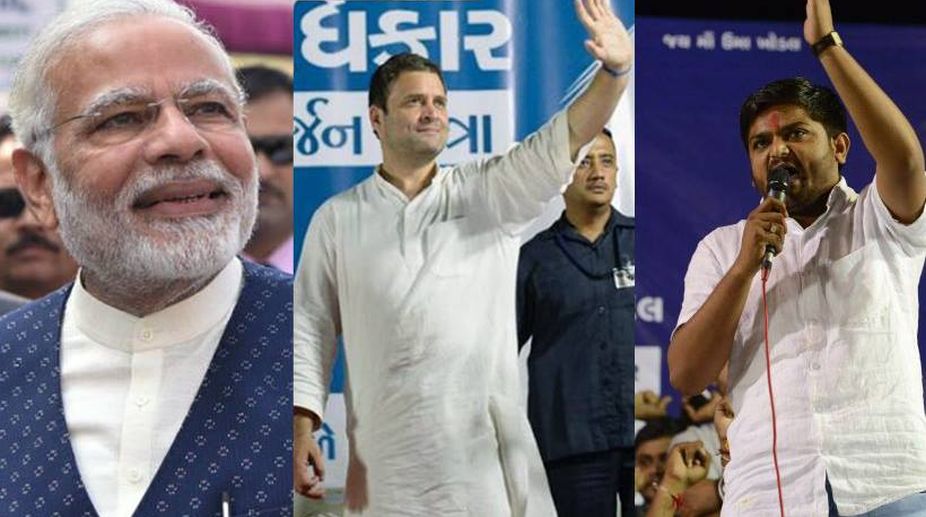KCR slams BJP, Modi over Kavitha’s arrest in Delhi liquor scam
He criticised Prime Minister Modi, alleging that Kavitha's arrest was a sign of political vendetta since they had tried to arrest BL Santosh for trying to bribe his MLAs.

The Gujarat Assembly election results have thrown up the trend of an urban-rural divide between the ruling BJP and the Congress as was seen during the 2015 civic polls in the state, a phenomenon that was also noticed during the local polls in Uttar Pradesh.
The December 2017 elections have also shown the opposition Congress eating into portions of the once-exclusive urban pie of the BJP.
The BJP picked up as many as 44 out of 55 seats in four major urban centres of Ahmedabad, Surat, Vadodara and Rajkot – but the Congress won 11 seats, three more than in 2012. Of the 127 semi-urban and rural constituencies, the Congress and its allies clocked victories in 72, against 55 of the BJP – clearly showing an edge of the opposition party.
Advertisement
Clearly, the impact of the Patidar agitation, demonetisation, Goods and Services Tax (GST), the severe farmers distress, unemployment, lack of cheaper education was experienced more in the rural belt, and so the BJP faced heat in these areas this time around.
The Saurashtra-Kutch region, which had been a BJP fiefdom for more than two decades, was captured by the Congress with 30 seats from among 54 – up from 16 in 2012. The BJP got only 23 and another went to NCP’s Kandhal Jadeja.
The region is the largest and of key importance since it sends the maximum number of legislators to the Gujarat Assembly.
The Congress won all the five seats of Amreli district, four of five in Junagadh, all four in Gir Somnath and three out of five in Surendranagar district.
The Dalits because of activist Jignesh Mevani and the Patidars inspired by firebrand leader Hardik Patel played a major part in several areas of the sprawling Saurashtra region.
The Congress wrested from the BJP the Una seat, where four Dalit youth were thrashed by cow vigilantes. The Patidar agitation had an impact on seats in neighbouring farming dominated districts.
On the other hand, despite the pitched agitation against demonetisation and GST as well as the Patidar movement, the BJP retained 15 of the 16 seats in Surat city.
The BJP won in urban areas in Bharuch and grabbed three of the five seats, while the party also retained its hold in relatively well developed and semi-urban areas of Valsad and Navsari. BJP won seven of the nine seats from these two districts.
Congress did well in rural and tribal dominated constituencies of South Gujarat, including Dangs, Tapi and Narmada districts, winning all the seven seats. Its performance was also better in rural seats in Surat district as well as Bharuch.
Bharatiya Tribal Party (BTP), the Congress’ alliance partner in the region, led by tribal strongman Chhotubhai Vasava, bagged two seats with he himself retaining his traditional Jhagadia seat for seventh time. His son Mahesh Vasava won from neighbouring Dediapada.
While the overall tally of Congress has improved in the state, it is central Gujarat which saw a dent compared to previous years, and the BJP appeared to have marginally gained by cracks in the Congress party. Congress, that had won 17 of the 40 seats in 2012, saw its seat tally dip by two. BJP this time won 21 seats from the region.
Of the Congress turncoats, Mansinh Chauhan, cooperative giant and Amul chairman Ramsinh Parmar, C.K. Raulji and Mahendra Vaghela, who all joined the BJP, only Raulji from Godhra was able to retain his seat.
The positives for the Congress in the region is that this time it could have a better grip in the tribal seats in the central Gujarat region.
In North Gujarat, believed to be one of the most volatile and erratic regions for both BJP and Congress with its 53 seats, including 21 from Ahmedabad, saw the Congress win only two seats more than the 21 it won in 2012. BJP saw its tally at 30 this time.
After a long struggle of two and a half decades, the Congress was able to make some headway in Ahmedabad city. It won Jamalpur-Khadia and Bapunagar, which had a huge influence of the Patel quota stir. However, BJP maintained its dominance in this primary urban pocket, bagging 15 of 21 seats.
The BJP has been able to retain key seats in pockets that witnessed massive protests by Patels, including Mehsana by Deputy Chief Minister Nitin Patel, and in the birthplace of the Patel agitation, Visnagar, Rushikesh Patel of BJP won. However, BJP lost to Patel bashing in constituencies as Unjha and Viramgam.
The Congress won six of the nine seats in Banaskantha, even as it shared equally the six seats in Sabarkantha with BJP.
Advertisement